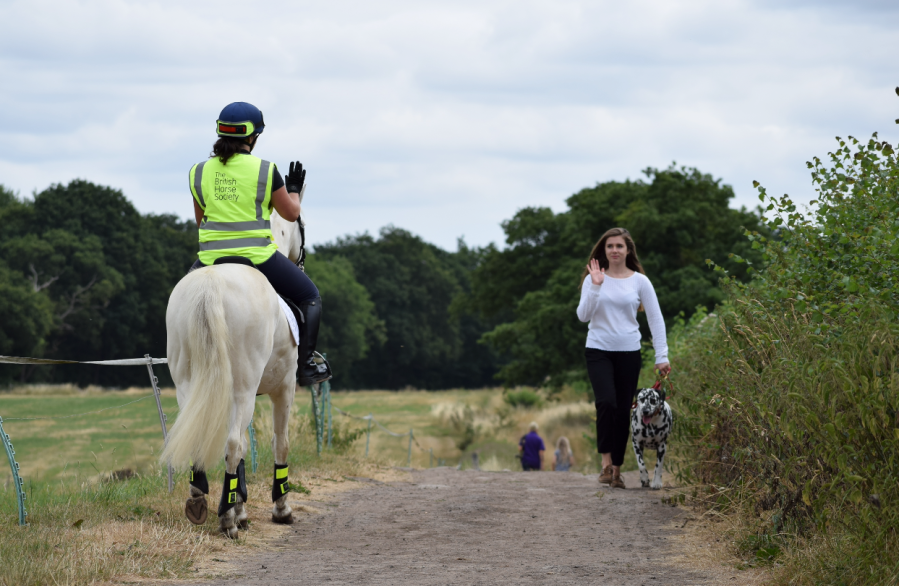Dogs are natural predators and horses are natural prey. Simple actions by dog owners can help save the lives of horses, riders and dogs alike. Last year alone, 39 horses were left injured in dog attacks, many while out hacking. This is an 8% increase on the year before.
As part of my role as Safety Team Leader at The British Horse Society (BHS), I frequently speak to equestrians whose horses have been involved in a great number of different safety-related incidents.
One very real issue we continue to face is the rise in incidents involving dogs. In fact, hundreds of cases are reported through our Horse i app every year after dogs have attacked or startled horses, often resulting in injuries and fatalities.
Many of us are animal lovers and own dogs, as well as our beloved horses. I am a dog lover, so I can understand how valuable a relationship with them can be. However, it’s important to remember that a dog’s natural predatory instinct can sometimes take over when encountering a ‘prey’ animal, and this can result in undesirable behaviours such as chasing or fleeing.
It can happen when a horse, historically a prey animal, is being ridden or driven on public rights of way, as well as when they are in their own turnout paddocks. Sadly, this was what happened to Georgia’s horse Frank.
Nasty gouge wounds
Frank was only 15 months old when he was attacked by a dog in his field, which did not have a public right of way through it. Frank was left with nasty gouge wounds on his legs, to the point where Georgia considered euthanising him.
When I heard about this heart-breaking story, I immediately got in contact with Georgia. There is nothing I can do to alleviate the pain both Frank and Georgia were feeling, but I tried to support Georgia with getting the help she needed.
Meeting her was a memorable experience. Georgia and Frank’s strength was incredible to see, despite the obvious trauma that lingered. Although Frank recovered well physically, he is nervous now, particularly around dogs. Originally a show pony, sadly his scars have put paid to that career.
It is vital to our work at the BHS that incidents like these continue to be recorded through our Horse i app. Not only are we able to offer individual support to those who share their stories, but these recorded incidents also play a critical role when it comes to supporting our work towards keeping both horses and dogs safe.
Every incident recorded helps us to understand the rate of incidents involving equestrians and dogs across the UK. This concrete evidence enables us to reinforce the issue at hand and work in partnership with other organisations, such as the Kennel Club. I’ve found that it’s these regular conversations with the key stakeholders that make a big difference.
Taking action
We continue to share top tips and clear advice with our stakeholders as well, which can then be shared with their network. We strive to offer guidance to horse owners too, including how to communicate clearly with dog owners and what to do should the worst happen and your horse is attacked.
Critically, we also encourage everyone to report incidents to their local police so that they don’t go unnoticed in your area. Together, we can work collectively to raise awareness and educate dog owners on how dogs and horses can interact safely with one another.
Our aim is to make sure that you remain safe wherever you ride, drive or keep your horse. Only by collating incident information, and working collaboratively, can we do this successfully.
What to do if you meet a dog out hacking
- Slow down to a walk, and stop if necessary to give the walker time to put a lead on the dog. If a dog is loose and you cannot see an owner, call out to let them know you are there.
- Make sure they have seen you. If you’re not sure, call out and say “hello”. Wearing high vis, even when not on the road, helps other people see you earlier.
- Give dogs a wide berth: don’t ride directly at them.
- If a dog gives chase, remain calm and move your horse away from the dog.
- Keep your horse’s head away from the dog and allow your horse to defend themselves if they need to.
- Make a note of any identifying features of the dog and its owner; try to get contact details in case the incident needs following up.
- Check your horse over when it is safe to do so. If necessary call your vet asap. This is particularly important if your horse is bitten by a dog, especially if the bite is on a joint.
View the BHS’s advice for horse and dog owners here









